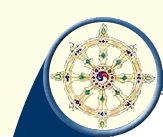|
NSC Lecture Series
at the University of New Mexico Campus
Dr. Biraj Karmacharya's visit to UNM (June 21 - June 25, 2012)
Director, Department of Community Health, Dhulikhel Hospital, Kathmandu University, Nepal
(Sponsored by RWJF at UNM and Nepal Study Center, UNM)
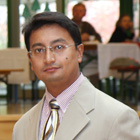
Short Biography
Dr. Karmacharya completed his Bachelor of Medicine and Bachelor of Surgery from College of Medical Sciences, Kathmandu University, Nepal. He also received a Master of Science in Tropical Medicine from Mahidol University, Thailand. He worked at Dhulikhel Hospital, Kathmandu University (KU) Hospital, as the Chief of the Department of Community Programmes.
His research focuses on
epidemiological analysis of the maternal health trends since 1990
in developing countries with a special focus on health systems.
His research aims to identify best practices in health systems in
relation to maternal health in developing countries. Moreover, he
hopes that the epidemiological model that he plans to develop for
this analysis also has potential to be applied for other health
issues in developing countries.
Health and Microfinance Program at KU
Through Dhulikhel Hospital, Dr. Karmacharya has been extensively involved in developing and setting up community based health endeavors in rural Nepal. Organizing women through the microfinance/microinsurance and empowerment programs, training them in health issues, and then mobilizing them for community health programs has been one of the major successes of this program, among a range of other novel approaches to rural health systems in the country. These projects may be very useful for rural health care applications in other developing countries as well. As the Coordinator of International Collaborations at Dhulikhel Hospital, he has been very involved in forging collaborations with various international institutions and is has been engaged in setting up the hospital’s Institute of Global Health.
Health and Microfinance Program Related Clinic Location Map and Photos
Click here for details about Kathmandu University's global health development program: microfinance, microinsurance, and empowerment program.
Click here for a map of the geographic locations of the Dhulikhel Health Clinics and Partnership Clinics.
Click here for KU's Dhulikhel Hospital and Bahunpati Clinic photos.
Some district photos: Dhulikhel, Sindhupalchowk, Solukhumbu, Dhading.
Tentative Program Outline
June 21st:
Arrival in Albuquerque (evening); Accommodation: Embassy Suites
June 22nd:
>8:30AM - 10AM Meeting at RWJF Center (Dr. Charlene Lynn Porsild; Dr. Alok K. Bohara; Dr. Denise Wallen)
>10AM-11:AM: Meeting with RWJ AEA students and a talk program. Global Health and Development: health education and women's empowerment through microfinance and microinsurance programs. Click here for their microfinance/health program.
>12AM: Lunch (RWJF)
>Dinner with faculty
(host: Professor Rochin Refugio; location Albuquerque Old Town)
June 23rd and 24th: (New Mexico sightseeing)
June 25th:
>8:30AM meeting with Dean of Arts and Sciences Dr. Mark Peceny.
>10:AM meeting with Associate Provost for International Initiative, Professor Natasha Kolchevska
(Advancement of linkages between the two MOU partners --UNM and KU)
>11AM - 4PM
Hosts: Dr. Dale Alverson, Dr. Mark Hauswald, and Dr. David Wachter (School of Medicine, UNM)
(Discussion on Telehealth and the Telemedicine Society of Nepal, teleconferencing problem-based learning (PBL) sessions with students from U.N.M. and K.U., safe motherhood, disaster preparedness and response, emergency medicine, obstetrics and gynecology, pediatrics and behavioral-mental health.) (Room and time TBD)
Global Health Nepal Program at School of Medicine, UNM
June 25th:
(Departure for Seattle at 6:05PM)
Building Linkages between UNM and ICIMOD
Climate Change in the Himalayas: Challenges and opportunities for collaborative research and knowledge development with academia
Dr. Madhav Karki's UNM visit (May 20th -May 22nd, 2010)
Powerpoint presentatation in pdf
 |
Bio: Madhav Karki has been working as the Deputy Director General of ICIMOD since 2005. Before joining ICIMOD, Dr. Kakri worked as the Senior Programme Officer in IDRC, Canada’s South Asia Regional Office (SARO), New Delhi for over 10 years. He also worked as Professor of Forestry/Range Management at the Institute of Forestry, Nepal for 13 years during which time, he also served as the Acting Dean, and the Assistant Dean of the Institute for about 10 years. Dr, Karki has worked as the Research Leader of several international research projects in Forestry, High Value Crops and Value Chain Development, environment, and economic development. He has considerable experience in university level academic curriculum development, teaching, academic research and administration. He has worked in designing and planning large multilateral and bilateral development projects in NSouth Asia. He has edited a number of publications and published over 60 technical papers and monographs.
|
Deputy Director General of International Centre for Integrated Mountain Development (ICIMOD) Dr. Madhav Karki interacts with the UNM faculty, officials, and graduate students to explore collaborative research opportunities. Dr. Karki was a co-signatory with Executive Vice President and Provost Dr. Suzanne Ortega of UNM on the Memorandum of Understanding (MOU) between UNM and ICIMOD making the UNM an Associate member of the 8-country Himalayan University Consortium (HUC) [November, 2009].
Dr. Karki's tentative program at UNM:
May 20, Thursday
Department of Economics Program:
9:30AM - 10:15AM -- NSC's GIS / ecology-related research demonstration (habitat modeling, food security and eco-system)
10:15AM - 10:45AM -- Experimental lab visit (Professor Janie Chermak)
10:45AM - 11:00AM -- poster session in Room 1052 -- ecology, GIS, environmental, food security, benefit estimates, etc... (all students are welcome to present and participate)
11:00AM - 12:00AM -- Dr. Karki's presentation on ICIMOD's South Asian initiatives (20 minutes) and subsequent discussions (open session).
12:00 (Lunch with faculty -- Professor Bob Berrens (Chair, Economics Department), Professor Alok Bohara, Professor Kristine Grimsrud, and Professor Janie Chermak).
Campus-wide Program (College of Arts and Sciences):
2:30PM - 4:00PM --
meeting with campus-wide faculty organized by the College of Arts and Science (20 min presentation by Dr. Karki followed by Q/A)
Room: Ortega 335
Topic: "Climate Change in the Himalayas: Challenges and opportunities for collaborative research and knowledge development with academia" : A short (30 min.) presentation by Dr. Karki to be followed by discussions on various research initiatives of ICIMOD in areas of climate change,
bio-diversity, and sustainable living with a focus on the 3000 KM long Himalayan range. In addition, he will also discuss ideas to strengthen UNM's links with the 8-country Himalayan University Consortium (HUC) initiative.
4:30PM-5:30PM -- Happy Hour at the faculty club (everyone is welcome)
May 21, Friday
9:30 AM: Meeting with Dr. Michael Dougher (Associate Vice President for Research), Dr. Philip Ganderton (Associate Dean for Research, College of Arts and Sciences), Dr. Felipe Gonzales (Senior Associate Dean, College of Arts and Sciences)
10:30 AM: Meeting with Executive Vice President and Provost Dr. Suzanne Ortega
Background:
ICIMOD focuses on bio-diversity, climate change, water resources, payment for eco-services and sustainable living etc. In addition, they also work in the communities to help them improve their livelihood through developing and improving sustainable methods and technologies.
Among many other things, ICIMOD has been actively engaged in tracking the glacial melting, forest fires, (e.g., NASA collaboration) and houses state of the art GIS capability... all with a focus on the 3000 KM Himalayan range, spanning from Afghanistan to Myanmar that includes Pakistan, India, Nepal China (Tibet), Bhutan and Bangladesh.
The HUC initiative is focused on building research and teaching capacity of the universities in the region. UNM is the only member from North America. Nepal Study Center (UNM) has been heavily involved in these initiatives to link UNM to ICIMOD and other collaborative partners in the region. NSC (UNM) now has a branch office at Kathmandu University's School of Management Complex in Kathmandu Valley. Tucked between the two rising giants China and India this branch office at KU in Nepal provides us with an opportunity and platform to explore research collaborations in the region.
To learn about UNM's MOU signing trip to Kathmandul in November of 2009, please click here.
Economic Reforms & Democracy in Nepal
Prem Khanal
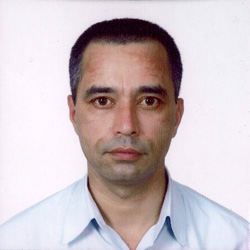
Reagan-Fascell Democracy Fellow, National Endowment for Democracy; author of An Analysis of Public Expenditure in Nepal (2005) & A Study on Government Plans, Programs & Budgets Affecting Children in Nepal (2002) Powerpoint Slides
Friday, February 8th
12:00 — 13:00 pm
Social Sciences Building Room 2069
Department of Political Science, UNM
Drawing on his background as an economic journalist, Mr. Khanal's talk focuses on the significance of political resistance to economic reform in four major sectors — finance, governance, labor, and resource allocation — and the effect this resistance has on the development of a stable democracy.
Seminar Title: Civil Society Actors, Social Movement and Regime Change: A Success Story From Nepal
Dr. Devendra R. Panday, December 8, 2006
Powerpoint slides
A short video clip of the movement
[Courtsey: UNM graduate students, Prakash Adhikari (political science), Ananda Regmi (electrical engineering), and Mani Nepal (economics)]
Program flier
Seminar Paper, pdf version: Social Movement, Civil Society and Regime Change in Nepal
(Revised version.)
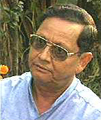
(Source: nepalnews)
(Development Economist, Former Finance Minister of Nepal, Former President of the Transparency International Nepal, Civil Society Leader, and Coordinator of Citizens' Movement for Democracy and Peace)
Organized by The Nepal Study Center in collaboration with the Department of Sociology, Department of Political Science, International Studies, and Peace Studies of the University of New Mexico
Location: SSCI 2069, Department of Political Science, University of New Mexico
(Second floor, Social Science Building behind the Zimmerman Library)
Time:
2:30 p.m. on Friday Dec. 8, 2006.
For more information, please contact:
Maria Daw: 277-5304
Joann M. Buehler: 277-2821
Some useful links about Dr. Panday:
Social Movement and Media Watch
Asia Media
On Economy
Nepal's Failed Development: Reflections on the Mission and the Maladies. Devendra Raj Panday. Kathmandu: Nepal South Asia Centre, 1999, viii and 432 pp.
On Corruption
Transparency International, Nepal Chapter
Seminar Title: Economic Development and Conflict in Nepal
Dr. Shankar Sharma, Feb. 24, 2006
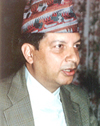
(Source: nepalnews)
(Economist, Former Vice-Chairman of the Planning Commission of Nepal)
Draft of Summary Presentation: Development and Conflict in Nepal by Dr. Shankar P. Sharma
Date: February 24, 2006, Time: 3:00 pm Room: 1052
Building: Economics Bldg. #57
(Social Sciences Bldg.)
This presentation will try to examine the development challenges resulting from conflict in Nepal and present some of the reform initiatives introduced to improve the socio-development activities in the country.
For more information, please contact:
Maria or Sarah: 277-5304
Seminar Title: In Defence of Democracy
by Dr. Ram S. Mahat, October 27, 2005
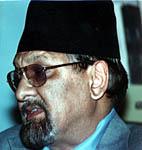
(Source: nepalnews)
(Economist, Finance Minister of Nepal)
Nepal Study Center at UNM organized a talk program in collaboration with Peace Studies, Dept. of Political Science, International Studies, the Water Resources Program, and the Department of Economics (Oct 27, 2005). Dr. Mahat gave two talks:
1. Political Economy of the Arun III Hydro Power Project
This talk in the afternoon was attended by about 50 students (graduates and undergraduates), and was moderated by Professor Jennifer Thacher. Dr. Mahat highlighted various interlinked political economy complexities: domestic politics, environment, and the donor culture. Many insightful questions livened the discussions.
To view the paper, please click here: The Loss of Arun III
2. Nepal: Which Way from Here? Democratic Experience, Insurgency and the Prospects for Development
Later that afternoon, Dr. Mahat gave a very impressive talk and educated the audience about the Nepali situation. His talk, among other things, focused on the evolution of democracy and its significance in unleashing unparalleled Nepali entrepreneurial ingenuity during the brief 12 years of democratic era.
Program Flyer
Program Itinerary
Video Clips
|
 |
|
